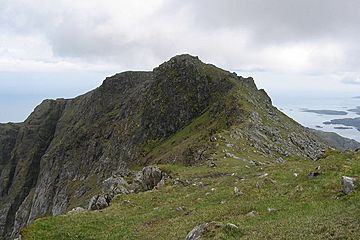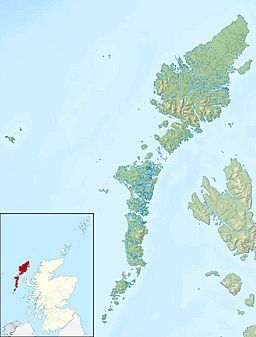Beinn Mhòr (South Uist) facts for kids
Quick facts for kids Beinn Mhòr or Geitaval |
|
|---|---|

The narrow summit ridge just below the top, June 2004
|
|
| Highest point | |
| Elevation | 620 m (2,030 ft) |
| Prominence | 620 m (2,030 ft) |
| Listing | Graham, Marilyn |
| Naming | |
| English translation | Big mountain |
| Language of name | Gaelic |
| Geography | |
| OS grid | NF809310 |
Beinn Mhòr is a mountain located on the island of South Uist. This island is part of the Outer Hebrides, a group of islands off the coast of Scotland. Beinn Mhòr is special because it is the highest point on South Uist.
The mountain stands tall at 620 meters (about 2,034 feet) above sea level. Its name, Beinn Mhòr, comes from the Scottish Gaelic language. In Gaelic, it means "big mountain." However, the correct Gaelic name for this mountain is actually Gèideabhal.
Contents
Discover Beinn Mhòr: South Uist's Highest Peak
Beinn Mhòr is a very important landmark on South Uist. It offers amazing views of the surrounding islands and the Atlantic Ocean. Climbing this mountain is a popular activity for hikers.
Where is Beinn Mhòr Located?
Beinn Mhòr is found in the northern part of South Uist. South Uist itself is one of the larger islands in the Outer Hebrides. These islands are known for their beautiful, wild landscapes and unique culture.
The Outer Hebrides are a chain of islands off the west coast of mainland Scotland. They are famous for their stunning beaches, ancient ruins, and rich Gaelic heritage. Beinn Mhòr stands out as a prominent feature in this island chain.
What Does "Beinn Mhòr" Mean?
The name Beinn Mhòr is a direct translation from Gaelic. It simply means "big mountain." This name perfectly describes its size and importance on the island.
While "Beinn Mhòr" is the common name, its older and more traditional Gaelic name is Gèideabhal. Many places in Scotland have Gaelic names, reflecting the country's long history and language.
Exploring the Mountain's Features
Beinn Mhòr is not just a high point; it also has interesting features. The mountain has a narrow ridge near its top. This makes the final part of the climb exciting for adventurers.
The views from the summit are truly breathtaking. On a clear day, you can see other islands in the Outer Hebrides. You might even spot the mainland of Scotland in the distance.
Images for kids



